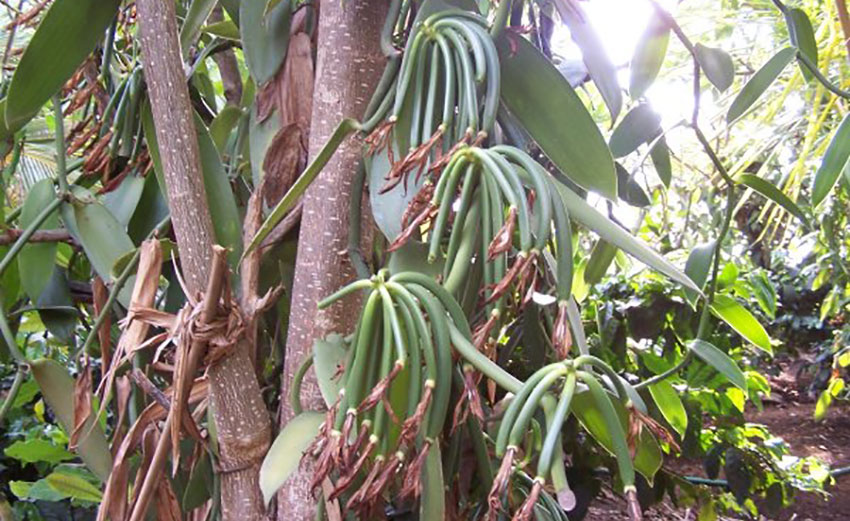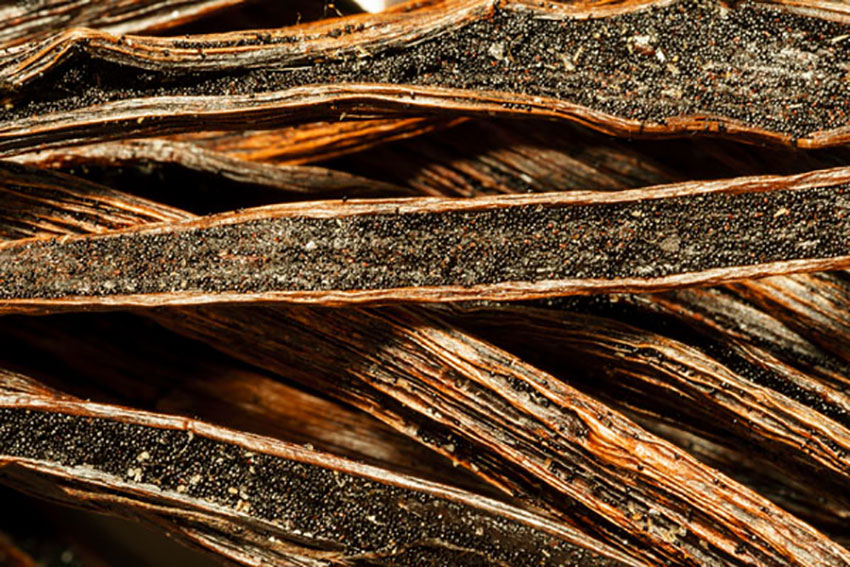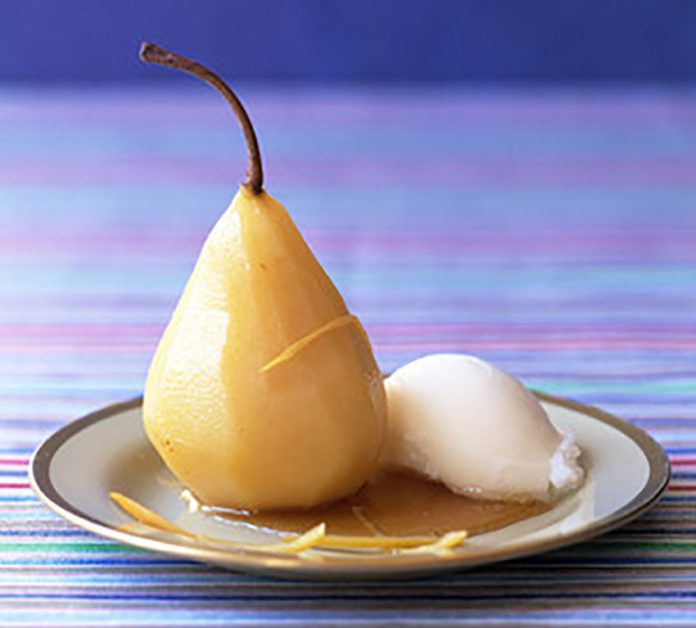People often crow about the fantastic deal they got on a giant bottle of “real vanilla extract” in Mexico. Despite what the label says, though, chances are it isn’t real vanilla at all; it’s imitation vanilla made with ingredients you probably don’t want to be ingesting.
Why do I say this? For me it started with Patricia Rain and her informative website. She’s a socially conscious author, educator and culinary historian dedicated to the promotion of pure, natural vanilla and the support of vanilla farmers around the world. It was through Rain’s research and work that I began to understand why vanilla – made from the seed pods of a fragile orchid — costs so much and what my options really were in terms of buying it.
Just last week, the Mexican Comité Sistema Producto Nacional de la Vainilla (National Vanilla Product Committee) released a statement declaring that “95% of vanilla consumed in Mexico is artificial.” The article goes on to describe widespread use of coumarin – used to make rat poison and banned in the U.S. — and the formation of the Mexican Institute of Vanilla (Instituto Mexicano de la Vainilla) to increase production and bring back the integrity of Mexican vanilla.
Whoa!
Let’s back up a bit. Mexico has a long history of vanilla-growing; without getting too detailed, a host of factors have contributed to its current difficulties. These include petroleum companies stripping hardwood forests in the Gulf’s vanilla-growing region, the declining bee population, climate change, increased production of lower-grade vanilla in Madagascar and Indonesia and saturation of the market with artificial vanilla extract labeled otherwise.

Each year, the majority of vanilla beans grown in Mexico – a declining total crop of less than 10 tonnes in 2019, compared to about 1,700 tonnes from Madagascar — are purchased to make extract in the United States. Nevertheless, supposed Mexican vanilla beans and extract are still for sale in Mexico, where stores and vendors hawk bottles of “PURE VANILLA EXTRACT.”
But consumers should be aware that vanilla beans are brought into Mexico from other countries (mainly Madagascar) and are then sold as Mexican. The same is true of extracts: the sad fact is that almost all of so-called “real vanilla extract” bought in Latin America is imitation vanilla.
How can that be? Well, in Mexico labeling laws aren’t enforced so don’t believe that the label screaming “100% REAL MEXICAN VANILLA!” is an accurate account of the ingredients. Synthetic vanilla may include paper pulp and coal tar, and most likely also coumarin, mentioned above. It doesn’t matter if it’s clear or dark, or how good it smells — it’s still nothing but synthetic vanillin.
“If you want synthetic, buy it in the U.S.; it’s the same price as you’d pay in Mexico but American synthetics aren’t adulterated with dangerous additives,” says Rain. “If you want pure Mexican vanilla extract, and are prepared to spend for it, buy it from a reputable dealer.” (Full disclosure: yes, that includes from her website.)
Basically, you get what you pay for. In 2018 vanilla beans cost more per ounce than silver. (Because they’re so valuable, theft of immature beans from the vines often makes nervous farmers pick too early, resulting in an inferior product.) Current vanilla prices are US $400 a kilo for beans at source, depending on size and quality, and extract-grade beans are even more expensive. When shipping, customs and other fees are added, the price can be $100 more per kilo.
“How much did you pay for it? That’s the biggest tip-off,” says Rain. “Pure vanilla extract usually costs more in Mexico than in the U.S. If it’s in a big bottle and you paid $20 or less, it’s not pure vanilla extract, no matter what the label says.”

With that in mind, here are a few unusual recipes that include vanilla.
Roasted Beet Salad with Whipped Ricotta & Mint
- 2-½ pounds beets
- Olive oil
- 2 Tbsp. fresh lemon or lime juice
- 1-2 Tbsp. tangerine or orange juice
- Zest of 1 lemon and 1 orange/tangerine
- ¼ tsp. vanilla extract
- Salt and pepper
- 1 cup requesón or ricotta cheese
- 1 Tbsp. milk
- Fresh mint, minced
Heat oven to 375 F. Cut off beet root and end tops, wash, then cut into quarters. Place in a baking dish and add enough oil so beets can be rolled in enough to coat all sides. Roast, turning a few times, until knife-tender but not soft. Allow to cool until easy to handle. Remove skins by running under cold water, then cut into chunks and set aside in a medium bowl.
For dressing, pour any leftover oil into a small bowl, adding more if needed. Add lemon juice, orange/tangerine juice, zest, vanilla, salt and pepper. Whisk together, taste, and pour over warm beets. In another bowl, whisk requesón or ricotta with cream or milk until smooth and creamy. Add mint. Serve at room temperature or chilled, topped with a dollop of ricotta mixture, on a base of baby greens. – www.VanillaQueen.com
Easy Tortellini or Ravioli Soup
- 1 carton (32 oz.) chicken or vegetable broth
- 2 garlic cloves
- 1-2 scallions, thinly sliced
- About 1 cup water
- 1 pkg. tortellini or ravioli (any filling)
- 1 cup fresh or frozen peas, corn or mixed vegetables
- Fresh baby spinach or chard, chopped
- Salt and pepper
- Splash vanilla extract
- Parmesan cheese
- Optional: Lemon juice
Thinly slice garlic cloves lengthwise. Combine broth and water in medium saucepan. Over high heat, bring to boil. Reduce to medium and simmer 5 minutes. Add pasta and vegetables and cook 3 minutes or until pasta is done. Remove from heat, season with salt and pepper, add vanilla and lemon juice. Garnish with Parmesan. Adjust seasonings and serve.
Spiced Vanilla Poached Pears
- 4-8 ripe, firm Anjou or Bosc pears
- 1 bottle fruity white wine such as Reisling or Gewurtztraminer (can substitute white grape juice)
- ½-1 cup sugar or honey
- 1 vanilla bean, sliced lengthwise but still intact
- 1 cinnamon stick
- 4 allspice berries
- 4 black peppercorns
- 1 star anise
- 2 whole cloves
Carefully peel pears, leaving stems intact if possible. Cut ¼ inch off the bottom of each so they stand up more or less straight. In deep saucepan, combine wine or juice, sugar and spices and bring to a boil. Reduce heat to high simmer and add pears. Poaching liquid should cover pears at least half-way. Add more water, juice or wine if needed. Cover pan and poach pears for 15–30 minutes (depending on variety of pears and ripeness), basting frequently.
When pears are tender when pierced with a knife, remove from heat, and using a slotted spoon, carefully place on plate. Bring the liquid back to a boil and cook until reduced by half and slightly thicker. Remove liquid from stove and strain out spices and vanilla bean. (Rinse and save vanilla bean for another use.) Pour liquid over pears and serve with vanilla ice cream.
Janet Blaser of Mazatlán, Sinaloa, has been a writer, editor and storyteller her entire life and feels fortunate to write about great food, amazing places, fascinating people and unique events. Her work has appeared in numerous travel and expat publications as well as newspapers and magazines. Her first book, Why We Left: An Anthology of American Women Expats, is available on Amazon. Contact Janet or read her blog at whyweleftamerica.com.
